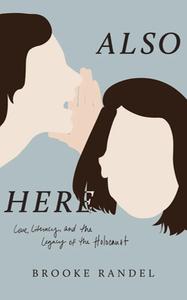
 Brooke Randel's debut, Also Here, is a poised, tender family memoir blending research with her grandmother Golda Indig's recollections of the Holocaust.
Brooke Randel's debut, Also Here, is a poised, tender family memoir blending research with her grandmother Golda Indig's recollections of the Holocaust.
"Bubbie" caught her granddaughter in her arms when Randel was born suddenly in her parents' car on her grandmother's driveway. Ever since, they have been close. Bubbie was warm and energetic; always giving, never asking. But in her mid-80s, she did make a request: that Randel, then an ad agency copywriter, write her story. Although Bubbie spoke multiple languages, she had only attended school for four years and was functionally illiterate.
Randel agreed and flew to south Florida to conduct interviews with her grandmother. The oral history that emerges is fragmentary and frenetic--full of impressions but few details, it couldn't stand on its own. The structure of the book makes up for this, though. Interview snippets are interspersed with narrative chapters based on follow-up research. Randel effectively contrasts facts and emotions, tracing how events translate into memories and, ultimately, written language. Vignettes from the Florida trip depict Bubbie's comfortable American lifestyle, a world away from the hardship of wartime Europe; the greatest threat she faced now was getting lost in a strip-mall parking lot.
Golda, born in 1930, grew up in Sighet, Romania. When the Nazis came, her older brothers were conscripted into forced labor. Her mother and younger siblings were killed in a concentration camp. At every turn, Golda's survival was miraculous. Only because her mother gave Golda her fur coat did the 13-year-old look old enough to avoid the first cull at Auschwitz. Transferred to Christianstadt with her older sister, Blimchu, Golda was twice sent left (to the crematoria) but snuck back into the right-hand line. Newly undocumented, she had to hide all day while the rest went to work in a munitions factory. Finally, they were moved to Bergen-Belsen. After liberation, Golda nearly died of typhus. The sisters returned to a deserted hometown. Of 14,000 Jews deported from Sighet, only a few hundred remained alive. As Bubbie repeats throughout these transcripts, "Unbelievable."
Golda married and immigrated to North America, cooking for her husband Benti's coffee shop and then, for decades, sewing leather seats in a General Motors factory. She endured widowhood and breast cancer. This concise, touching memoir bears witness to a whole remarkable life as well as the bond between grandmother and granddaughter that emerged as one generation's history was entrusted to another. Randel speculates about reasons for Bubbie's continued illiteracy but ultimately it is little barrier to a loving connection across the generational divide. --Rebecca Foster, freelance reviewer, proofreader, and blogger at Bookish Beck
Shelf Talker: Brooke Randel's touching family memoir--perfect for fans of Esther Safran Foer's I Want You to Know We're Still Here--captures her Holocaust survivor grandmother's life via oral history and research.

